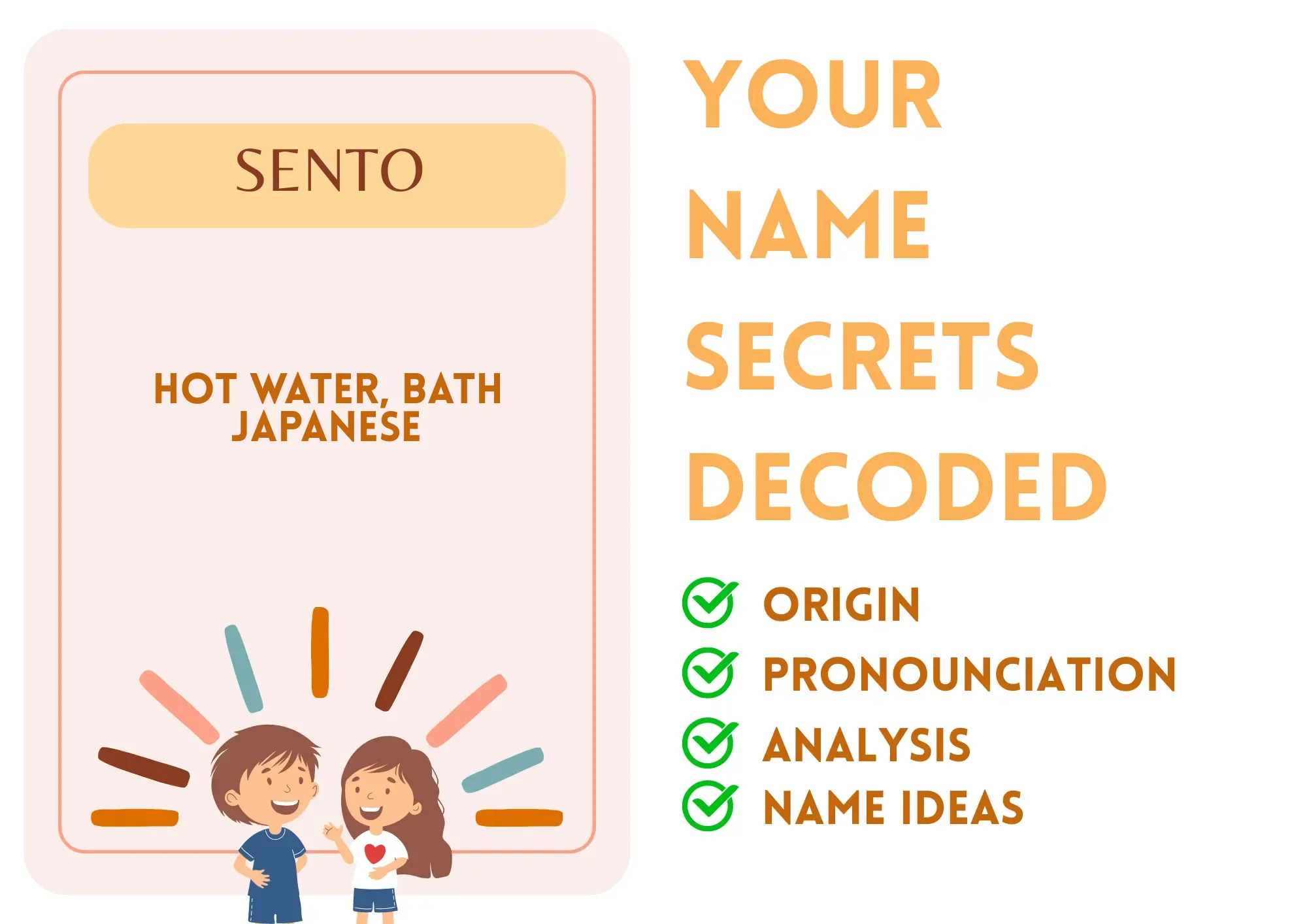
Sento
Sento is a unique name with varying interpretations across different cultures. In Japanese, it commonly translates to 'hot water' or 'bath', symbolizing comfort and relaxation, which is deeply ingrained in their culture of onsen (hot springs). In addition, it can refer to 'the way of the bath', emphasizing both hygiene and socialization. While it can be perceived as gender-neutral, it leans slightly towards a masculine use in some cultures.
It is relatively rare, making it special for parents looking for distinctive names. The name Sento is associated with serenity, warmth, and a positive lifestyle, resonating with the values found in Japanese traditions.
The simplicity of the name, consisting of five letters, makes it easy to spell and pronounce. People generally find Sento appealing due to its unique sound and cultural depth.
Basic Information
Gender: Unisex
Sounds Like: SEN-toh
Pronunciation Explanation: The first syllable is pronounced as 'SEN', rhyming with 'ten', followed by a soft 'toh' as in 'toe'.
Summary and Meaning
Meaning: hot water, bath (Japanese)
Origin: The name Sento has Japanese origins, reflecting cultural practices around bathing, wellness, and hospitality.
Usage: Sento is generally regarded as unisex, though it may favor masculine usage in certain contexts.
Name Number (Chaldean)
Name Number (Pythagorean)
Popularity (Global Rank)
Overall: 99354
Boys: 72681
Girls:
Most Popular in
Religious and Cultural Significance
Religion: Shinto
Background: In Shinto, bathing and purification are key aspects, reflecting the deeper connection between cleanliness and spirituality. The name aligns with these cultural practices.
Cultural Significance: Sento represents various cultural elements in Japan, including hospitality, serenity, and the age-old practice of communal bathing as a form of socialization.
Historical Significance: Historically, sento (銭湯) refers to public bathhouses in Japan, serving as centers for community interaction. It represents a tradition that has been cherished for centuries, emphasizing health and social bonds.
Popular Culture
Literature and Mythology: Though less common in traditional literature, themes of bathing and cleansing are prevalent in many Japanese fables and stories, often symbolizing renewal.
Movies and Television: Sento-related concepts appear in various anime and films, highlighting the importance of rituals around bathing and relaxation, portraying them as calming and communal experiences.
Feelings and Perceptions
Perception: Sento is generally perceived positively, associated with relaxation and tranquility. It evokes comforting feelings and a sense of peace.
Positive Feelings: Unique, serene, warm, culturally enriching, inviting.
Negative Feelings: Unfamiliar to many outside of Japanese culture, which might lead to mispronunciations.
Practical Considerations
Ease of Writing and Calling: Sento is straightforward to write and pronounce with only five letters and two syllables, making it memorable.
Common Typos and Misspellings: Sento,Sentto,Sendto,Centho
Common Nicknames: Sen,To
Sento Popularity
Sento Usage and Popularity By Country
| Country | Rank (Overall) |
|---|---|
| Spain | 4594 |
| Bahrain | 9628 |
| Bangladesh | 10236 |
| Venezuela | 12428 |
| Japan | 16713 |
| Egypt | 20205 |
| Uganda | 20326 |
| Turkey | 44234 |
| Netherlands | 45369 |
| Indonesia | 54016 |
Sento Usage and Popularity By City
| City | Rank (Overall) |
|---|---|
| Valencia | 813 |
| Madrid | 10637 |
| Barcelona | 9096 |
Compatibility Analysis
Famous Persons Named Sento
Related Names
Similar Sounding Names:
Kento,Lento,Bento,Jento
Similar Meaning and Related Names:
Sibling Name Ideas (Brothers):
Kaito ♂️
Ren ♀️
Buddhist, Shinto (Japanese), Confucian (Korean)